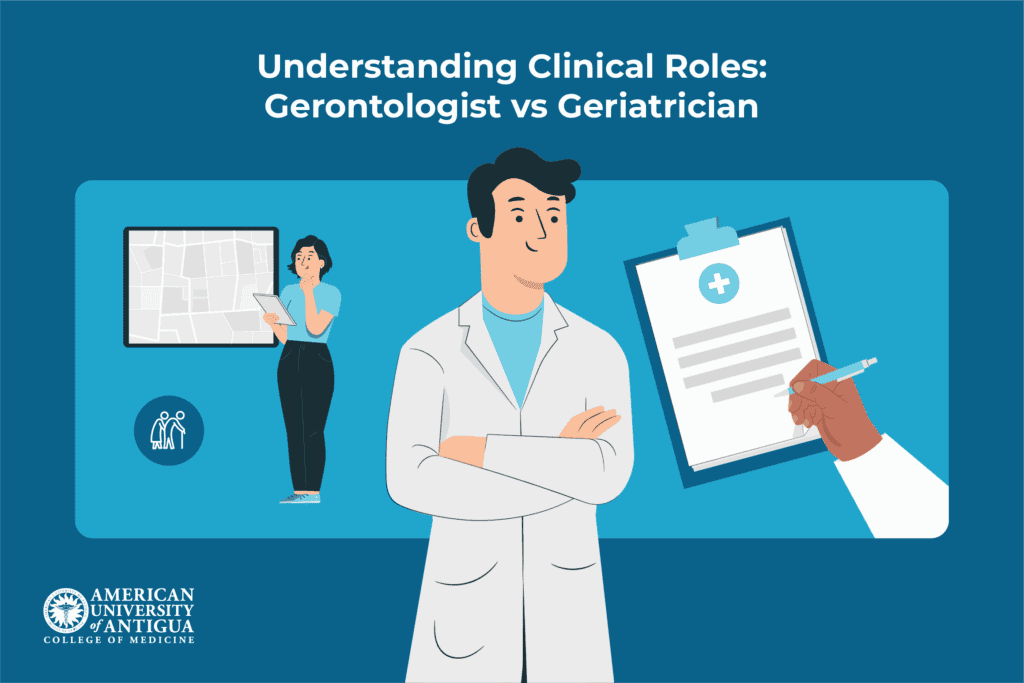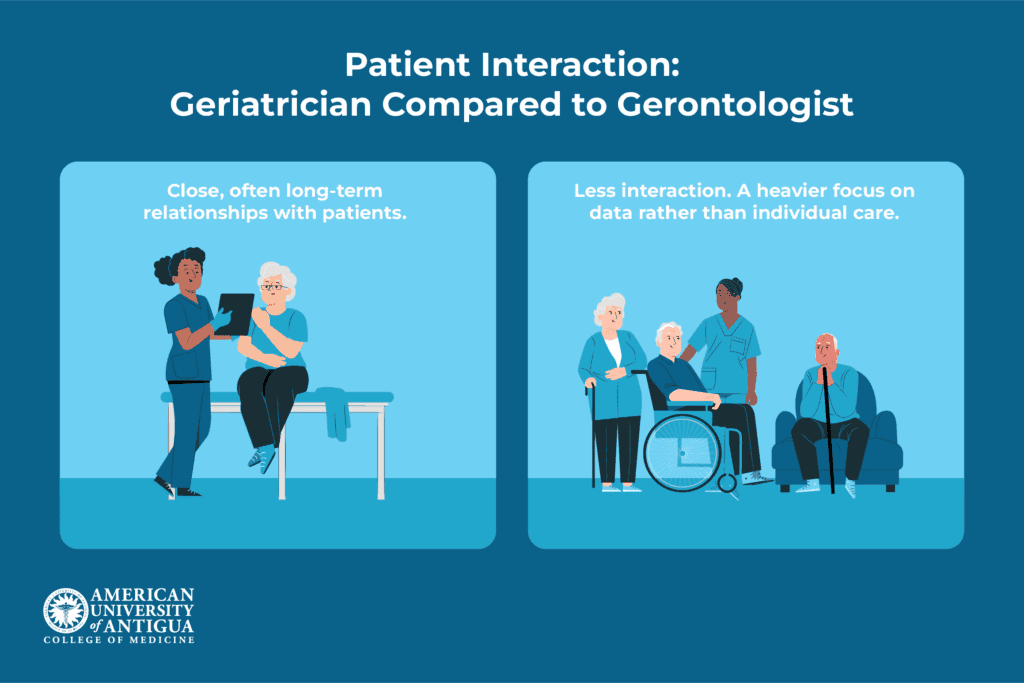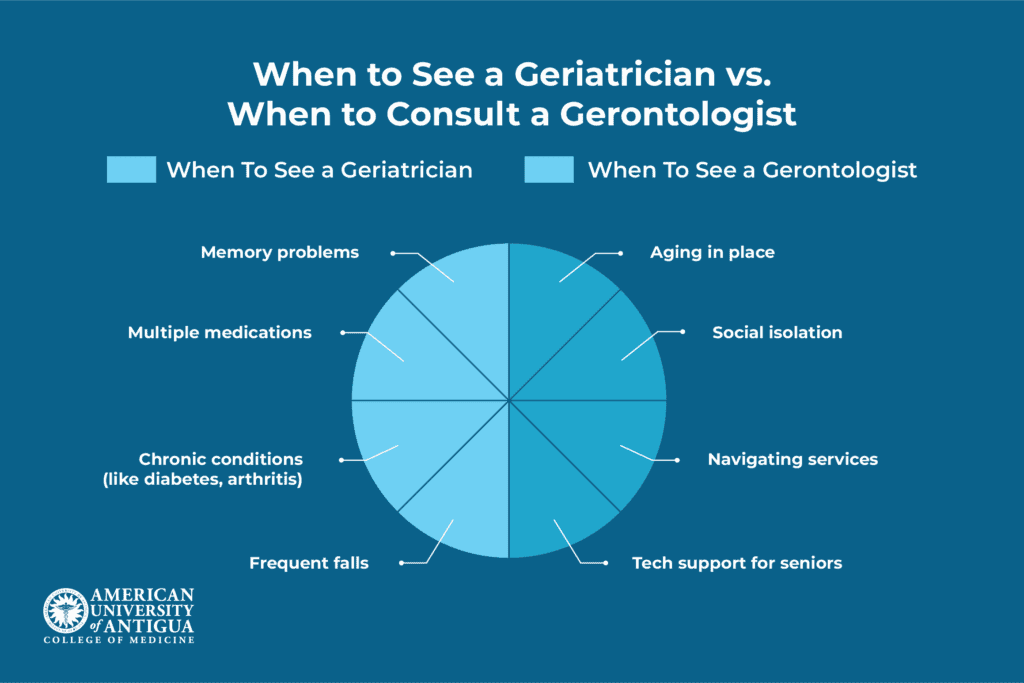Gerontologist vs. Geriatrician: Roles and Career Comparison
Key Takeaways
- Geriatricians are medical doctors who diagnose and treat age-related health conditions, while gerontologists focus on the social, psychological, and biological aspects of aging without providing medical care.
- Though both careers are rewarding, geriatricians earn an annual salary of $220,000, while gerontologists make up to $50,000 or more, depending on the career focus.
- If you’re 65 or older and have multiple chronic conditions, memory issues, or complex medication needs, you should see a geriatrician. You can also consult a gerontologist for aging-in-place planning, elder care resources, or lifestyle support.
As the global population grows older, where 1 in 6 people are expected to be 60 by 2030, the need for specialized professionals in aging care has never been more urgent. From physical health to emotional well-being, older adults face unique challenges, and that’s where gerontologists and geriatricians take center stage.
Though these two roles are often confused, they serve different but equally vital purposes. Understanding the difference between a gerontologist and a geriatrician will help you realize how their unique paths shape elder care.
✅ Request information on AUA's MD program TODAY!
What Is a Gerontologist?
A gerontologist is a professional who studies the aging process and the challenges that come with it. Gerontology—the field they specialize in—looks at aging from multiple angles: psychological, social, and biological. Instead of treating diseases, gerontologists focus on understanding how aging affects individuals and society as a whole.
Their work can take many forms. Some conduct research on cognitive decline or aging in different cultural contexts. Others help shape public policy for elder housing, healthcare access, or retirement systems. Many also work in social services, consulting with businesses, senior care facilities, or government agencies to improve services for the elderly.
While they play a key role in elder care, gerontologists are not medical doctors. They do not diagnose or treat medical conditions but instead offer broader insight into the aging experience.
What Is a Geriatrician?
A geriatrician is a medical doctor specializing in the care of older adults, particularly those with complex health needs. Unlike general practitioners, geriatricians have advanced training in managing the unique challenges associated with aging, such as multiple chronic conditions, medication interactions, and functional decline.
Common conditions treated by geriatricians include dementia, frailty, falls, incontinence, and polypharmacy—the use of multiple medications that can lead to adverse effects. Their goal is to enhance quality of life, maintain independence, and prevent unnecessary hospitalizations.
Geriatricians work in various settings, including hospitals, outpatient clinics, nursing homes, assisted living facilities, and patients’ homes. They often collaborate with interdisciplinary teams comprising nurses, pharmacists, physical therapists, and social workers to provide comprehensive care
With the population getting older, the demand for geriatric care is also increasing. However, the Association of American Medical Colleges (AAMC) estimates a shortage of up to 124,000 physicians by 2034, including geriatricians, which makes pursuing this role a wise career choice to make.
Gerontologist vs. Geriatrician: Key Differences
Understanding the difference between a gerontologist and a geriatrician helps ensure the right care and expertise for aging individuals. Below, we break down how these roles differ in clinical involvement, education, patient interaction, salary, and career path.
Clinical involvement

Geriatricians are deeply involved in patient care, focusing on diagnosing and treating health issues in older adults. They manage complex cases like dementia, heart disease, arthritis, and medication complications.
For example, a geriatrician may adjust medications to reduce fall risks or create a care plan for someone with both diabetes and cognitive decline. Their role is hands-on and clinical, often requiring physical exams, lab tests, and regular monitoring.
Gerontologists, by contrast, usually do not diagnose or treat medical conditions. Instead, they study the aging process and work to improve quality of life through systemic analysis. For example, a gerontologist might research how urban design affects mobility in seniors or develop a social program to reduce isolation in a retirement community.
While they don’t provide medical care, gerontologists often collaborate with geriatricians to create well-rounded support plans that consider both health and social needs.
Education and certifications
The educational path for a geriatrician begins with a medical degree (MD or DO), followed by a residency in internal or family medicine. After that, aspiring geriatricians complete a fellowship in geriatrics and can pursue board certification in geriatric medicine through the American Board of Internal Medicine (ABIM) or similar organizations. This route takes over a decade of training and involves strict licensure and continued medical education.
Gerontologists, on the other hand, usually hold a bachelor’s or master’s degree in gerontology, psychology, sociology, or a related field. While not medical doctors, they may pursue specialized certifications, such as the Certified Gerontologist (CG) or the Gerontological Specialist Certification (GSC). Some go on to earn doctoral degrees in research or public health.
Unlike geriatricians, gerontologists don’t require a medical license, but academic credentials and certifications can strengthen their expertise and career prospects, especially in policy, social work, or research roles.
Patient interaction

Geriatricians work closely with patients, often forming long-term relationships. They interact one-on-one in hospitals, clinics, and nursing homes, providing ongoing care and managing chronic conditions. Their role is highly personal—they speak with patients about sensitive issues, support families, and make critical decisions about treatment plans.
Gerontologists may have less frequent direct interaction with patients, depending on their role. Some work in senior living communities, designing wellness programs or leading support groups. Others are based in research institutions, focusing more on data than individual care. Still, many gerontologists engage in meaningful dialogue with seniors, especially those in counseling, case management, or advocacy roles.
Emotionally, both roles can be rewarding and challenging. Geriatricians deal with the physical vulnerability of aging, while gerontologists often help address emotional and social concerns. Both require empathy, but the intensity and type of patient contact can vary widely based on the setting and career focus.
Salary and career path
Geriatricians typically earn $220,000 annually in the U.S., depending on location, experience, and workplace. Salaries are often higher in urban areas or academic hospitals and can increase with leadership or teaching roles. As the demand for geriatricians is rising, it offers stronger job security and opportunities for specialization.
Gerontologists, on the other hand, earn a more varied income depending on their job title. Though, in general, gerontologists can expect an annual salary of $50,000, this may often vary depending on their role – whether it’s research, social work, or program management.
Career paths in both fields are expanding. Geriatricians may move into academia, policy advising, or directorships of elder care programs. Gerontologists might lead nonprofit organizations, shape public health initiatives, or specialize in aging policy. Both roles offer meaningful work and growing relevance in an aging society.
When to See a Geriatrician or Consult a Gerontologist

Knowing when to seek help from a geriatrician or consult a gerontologist can make a huge difference in an older adult’s quality of life. These professionals serve different purposes, so understanding their roles can help you or a loved one get the right support.
You should see a geriatrician if you or someone you care for is dealing with multiple chronic conditions, frequent falls, memory issues, or taking numerous medications that might interact poorly. A visit typically involves a detailed medical evaluation, medication review, cognitive testing, and a personalized treatment plan aimed at improving function and independence.
On the other hand, a gerontologist is helpful when you’re planning long-term aging strategies. For example, if you’re exploring how to age at home safely, apply for social services, or want guidance on elder-friendly technologies or housing options, a gerontologist is the right person to talk to. These visits often involve interviews about lifestyle, social connections, and support systems rather than medical exams.
In many cases, both experts work together. While the geriatrician manages health conditions, the gerontologist can support overall well-being, helping older adults thrive physically, emotionally, and socially.
The Future of Aging Care
In the U.S. alone, adults 65 and older will outnumber individuals under 18 by 2034—a historic first. This shift is driving innovation in both gerontology and geriatrics.
Advances in longevity research aim to extend not just life but quality of life. Meanwhile, technological tools like telemedicine, wearable health monitors, and smart home systems are reshaping how care is delivered and tracked.
Telemedicine allows older adults to connect with healthcare providers from home, while wearable devices track heart rate, sleep, movement, and even medication adherence. These tools help geriatricians manage chronic conditions more effectively and allow gerontologists to study real-life aging patterns in greater detail.
Equally important is the rise of interdisciplinary care. According to research, integrating services across medical, social, and emotional domains leads to better outcomes and improved quality of life for older adults. This holistic approach places gerontologists and geriatricians at the heart of a more connected, personalized care system—one that supports not just living longer, but living well.
Conclusion
Both gerontologists and geriatricians play essential roles in supporting older adults to live healthier, fuller lives. The core difference lies in focus: geriatricians provide vital medical care, diagnosing and treating age-related health issues, while gerontologists approach aging from a holistic, social, and psychological perspective.
If you’re passionate about making a real impact in aging care, pursuing the MD program at AUAMED can set you on an exciting and rewarding medical career path. Whether in medicine or social sciences, the future of elder care needs dedicated professionals like you.
Frequently Asked Questions
What type of doctor is best for seniors?
A geriatrician is the best doctor for seniors, as they specialize in treating complex health issues related to aging, such as dementia, frailty, and medication management.
At what age should you see a geriatrician?
Most people consider seeing a geriatrician around age 65, especially if they have multiple chronic conditions, memory concerns, or are on several medications.
What are the three types of aging adults that gerontologists have distinguished between?
Gerontologists often categorize aging adults as young-old (65–74), middle-old (75–84), and old-old (85+), based on physical health, independence, and social engagement.
✅ Request information on AUA's MD program TODAY!